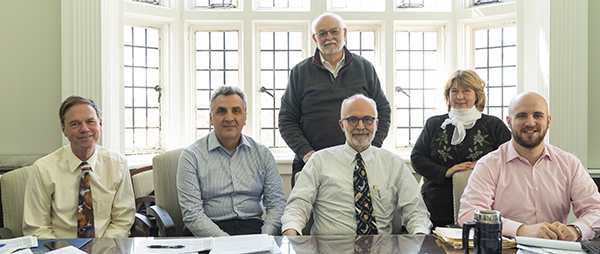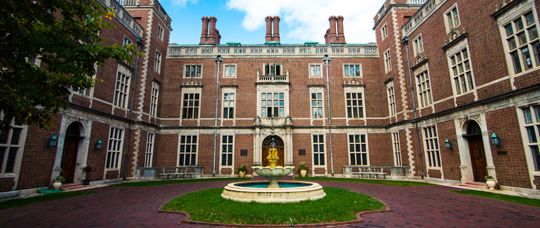A Message from the President:
By now, you all have heard about the admissions bribery scandal affecting many other schools around the country, where celebrities and other high-wealth individuals paid millions of dollars to an organization that guaranteed admission of their children into elite colleges through illegal methods. These methods included cheating on college entrance exams and bribing of college coaches to facilitate backdoor acceptances as athletes. These actions led to headlines in the media such as: “The most prestigious schools enroll lots of privileged students” and “Is the idea of meritocracy shattered?” This type of rhetoric causes concern on every college campus. I can assure you that at Webb, we hold the admissions process to the highest ethical standards.
So-called elite colleges are targeted in these schemes because they are the colleges that have more qualified applicants than openings available. They typically have some of the highest overall standards for entry. However, some of these colleges show favoritism to significant donors, well-heeled alumni, and famous people. At Webb, our admissions process is need-blind. An applicant’s ability to pay for room and board or other costs is not a factor in the admission decision. Furthermore, the members of the Admissions Committee are not given information related to the wealth of the applicants, and our Development Office provides no input into the process.
The Webb admissions process has undergone significant changes during the five years that I have been president. Webb’s Admissions Committee now consists of the President, the Dean, the Director of Admissions, the Assistant Director of Student Affairs, the Math Professor, the Humanities Professor, and two Engineering Professors. Whereas, the prior assessment was based heavily on entrance exams (SAT, ACT and Subject Tests), we now use these scores as only one of many factors to determine whether we will interview a student. Once selected for an interview, all prospective freshmen must spend a night at Webb, attend classes and spend time with our students. Their time at Webb also gives prospective freshmen an opportunity to learn about the many unique aspects of a Webb student and academic life, and ascertain whether the college is a good fit for them.

The Admissions Committee: President Keith Michel ’73, Adrian Onas, Richard Harris, Benjamin Scott, Elena Goloubeva, and Michael Malinowski.
Not pictured: Dean Matthew Werner ’95, PG’97, and Lauren Carballo
When on campus, each prospective freshman is asked to take a math quiz and write an essay. There are a number of reasons why we introduced this requirement several years ago. First, we have found that there is very little correlation between how well students do on the college entrance exams and how well they do at Webb. This is not surprising – the skills required to excel at engineering and design have little to do with a person’s ability to train for and take a multiple-choice test. Although our math quiz is relatively straightforward with just ten questions, the prospective freshmen are required to show their work. We find this quiz is a better indicator of a student’s understanding of math than the SAT/ACT tests. By having the students take the math quiz and write an essay while at Webb, we know it is their work. This experience introduces the candidates to our Honor Code. As one of our students hands them the assignment, they explain the Honor Code, and then leaves the room.
As President, I interview every prospective freshman. This has been the tradition since the founding of Webb and, I believe, an important part of the process. For the last four years, each candidate has also been interviewed by one of the faculty members from the Admissions Committee, as well as the Director of Admissions.
Two years ago, we hired Lauren Carballo as Director of Admissions. She is data-driven and has done an outstanding job of evaluating current data and past performance. The data have been very helpful to the Admissions Committee in their deliberations. The Committee takes into consideration all available information on a candidate: SAT and ACT score but in particular, the GPA and transcript, teacher recommendations, extra-curricular activities with an emphasis on leadership, three interviews noted above, input from our student body, and results of our math quiz and essay. Each candidate is extensively discussed by the Admissions Committee before a decision is made on whether to make an offer.
Being a highly selective college, Webb has a high bar for admissions. Even though we have reduced our emphasis on college entrance exams, the average SAT scores have increased over the past five years, exceeding 700 for verbal and 750 for math. The large majority of students rank in the top 15% of their high school class. We believe the changes in our approach to evaluating incoming freshmen are having positive effects on the student body. We now seek 26 to 28 highly qualified members in each class. We have enjoyed extraordinary retention over the last four years. Next year, we expect the student body to exceed 106 students, by far a record for Webb.
As discussed above, every student who is accepted to Webb must be highly qualified. We have learned that less qualified and prepared students will not last the freshman year. It breaks my heart to have to call an alumnus to tell them their son or daughter did not make it into Webb, but I trust that they appreciate the importance of maintaining the integrity of our admissions process. Once we have established that a student meets our standards, we do take into consideration the makeup of the student body. For example, over the last five years, we have increased the percentage of women at Webb from 15% to 25%. We have been slowly increasing the percentage of minorities at Webb. We have found that the best way to expand these underrepresented groups is to enlarge the overall pool of qualified applicants. Lauren Carballo has introduced new approaches to recruitment that are beginning to show results. This year, we have 144 applicants, the largest pool since 1978 when we began recording applicant data. Our ambitious five-year goal is to double the pool of qualified applicants.
Another aspect of the scandal related to the treatment of sports, with college coaches making inappropriate recommendations for student admission. It probably goes without saying that Webb does not do this. We do take into consideration a student’s extracurricular activities in high school, when such activities demonstrate commitment, time management, and leadership skills. Many of our students held the position of president, team captain, 1st Chair or other leadership positions at their high school.
We are doing our very best to maintain a level playing field for all applicants. With that said, I have no doubt there will be more changes in future years, as we continue to develop and improve the process for recruiting and selecting our students. Should you have any questions or comments on our admission process, or ideas on how we can improve it, please do not hesitate to contact me.
R. Keith Michel
President, Webb Institute

